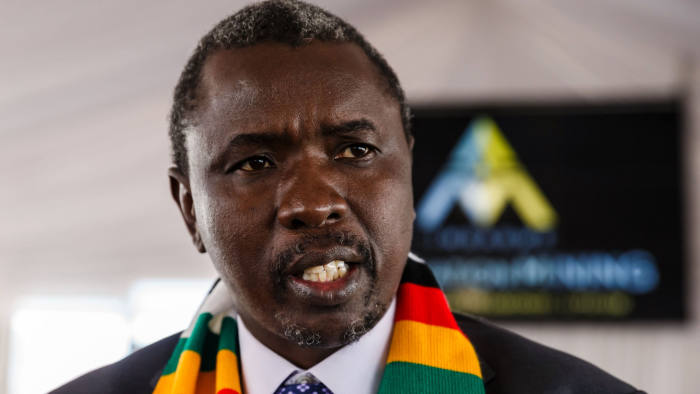
UK Announces Sanctions against Top Zimbabwe Official
The United Kingdom has imposed an asset freeze and travel ban on one of Zimbabwe President Emmerson Mnangagwa’s advisors for alleged corruption.
UK Foreign secretary Dominic Raab said the wealthy Kudakwashe Tagwirei was at the centre of a controversial government agriculture subsidy where he is alleged to have siphoned over $3 billion from the State through Treasury Bills.
The sanctions will also apply to any entities that the businessman owns or controls.
“(Mr Tagwirei) profited significantly from the misappropriation of property at the expense of wider macroeconomic stability in Zimbabwe, in one of the most serious incidences of corruption under the current government,” Mr Raab said.
“His company, Sakunda Holdings, redeemed government of Zimbabwe Treasury Bills at up to 10 times their official value.
“His actions accelerated the deflation of Zimbabwe’s currency, increasing the price of essentials such as food, for Zimbabwean citizens.”
Melanie Robinson, the British ambassador to Zimbabwe, said corruption was harmful to ordinary people.
“Corruption harms ordinary people, which is why the UK imposed an asset freeze and travel ban on Kudakwashe Tagwirei,” Ambassador Robinson said.
“I look forward to seeing the Zimbabwean government put its commitment to fight corruption into action.”
Mr Tagwirei was one of five people targeted in the UK sanctions under the Global Anti-Corruption sanctions regime.
Others that were targeted are Equatorial Guinea Vice President Teodoro Obiang Mangue, Venezuela businessmen Nain Saab Moran and Alvaro Enrique Pulido Vargas and an Iraq governor Nawfal Hammadi Al-Sultan.
Last year, the United States imposed similar sanctions on Mr Tagwirei whom it said “provided high priced items such as expensive cars to senior level Zimbabwean government officials.”
Several military figures and politicians from the ruling Zanu PF have over the years been sanctioned by the UK, US and the European Union (EU) for their alleged roles in human rights violations in Zimbabwe.
The US first imposed sanctions on Zimbabwe in 2001 when it enacted the Zimbabwe Democracy and Economic Recovery Act (Zidera).
Zidera bars Americans sitting on boards of international financial institutions such as the International Monetary Fund and the World Bank from supporting financing arrangements for the southern African country.
A year after the law was passed; the US introduced an executive order of measures that imposed a travel ban and an asset freeze against the late ruler Robert Mugabe and his close associates.
Zimbabwe argues that the sanctions were punishment for its land reform programme that began in 2000 and saw the seizure of nearly 5 000 commercial farms owned by white Zimbabweans that were re-distributed to landless blacks.K Announces Sanctions against Top Zimbabwe Official
News – Africa – Politics – Header
The United Kingdom has imposed an asset freeze and travel ban on one of Zimbabwe President Emmerson Mnangagwa’s advisors for alleged corruption.
UK Foreign secretary Dominic Raab said the wealthy Kudakwashe Tagwirei was at the centre of a controversial government agriculture subsidy where he is alleged to have siphoned over $3 billion from the State through Treasury Bills.
The sanctions will also apply to any entities that the businessman owns or controls.
“(Mr Tagwirei) profited significantly from the misappropriation of property at the expense of wider macroeconomic stability in Zimbabwe, in one of the most serious incidences of corruption under the current government,” Mr Raab said.
“His company, Sakunda Holdings, redeemed government of Zimbabwe Treasury Bills at up to 10 times their official value.
“His actions accelerated the deflation of Zimbabwe’s currency, increasing the price of essentials such as food, for Zimbabwean citizens.”
Melanie Robinson, the British ambassador to Zimbabwe, said corruption was harmful to ordinary people.
“Corruption harms ordinary people, which is why the UK imposed an asset freeze and travel ban on Kudakwashe Tagwirei,” Ambassador Robinson said.
“I look forward to seeing the Zimbabwean government put its commitment to fight corruption into action.”
Mr Tagwirei was one of five people targeted in the UK sanctions under the Global Anti-Corruption sanctions regime.
Others that were targeted are Equatorial Guinea Vice President Teodoro Obiang Mangue, Venezuela businessmen Nain Saab Moran and Alvaro Enrique Pulido Vargas and an Iraq governor Nawfal Hammadi Al-Sultan.
Last year, the United States imposed similar sanctions on Mr Tagwirei whom it said “provided high priced items such as expensive cars to senior level Zimbabwean government officials.”
Several military figures and politicians from the ruling Zanu PF have over the years been sanctioned by the UK, US and the European Union (EU) for their alleged roles in human rights violations in Zimbabwe.
The US first imposed sanctions on Zimbabwe in 2001 when it enacted the Zimbabwe Democracy and Economic Recovery Act (Zidera).
Zidera bars Americans sitting on boards of international financial institutions such as the International Monetary Fund and the World Bank from supporting financing arrangements for the southern African country.
A year after the law was passed; the US introduced an executive order of measures that imposed a travel ban and an asset freeze against the late ruler Robert Mugabe and his close associates.
Zimbabwe argues that the sanctions were punishment for its land reform programme that began in 2000 and saw the seizure of nearly 5 000 commercial farms owned by white Zimbabweans that were re-distributed to landless blacks.

